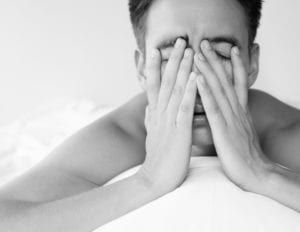Need Some Sleep? Let’s Talk to Your Bladder!
 Insomnia and poor sleep are prevalent among adults of all ages. Sometimes the issue is stress. Sometimes it may be a noisy neighbor. What shouldn’t be keeping you up at night is your bladder. If you are one of the millions of Americans (1 in 3) over thirty who is woken up two or more times each night by your bladder, you need to know there’s hope. At the heart of your sleepless nights may be the condition we call nocturia. Through thoughtful care, we may be able to resolve the issue – and your sleep.
Insomnia and poor sleep are prevalent among adults of all ages. Sometimes the issue is stress. Sometimes it may be a noisy neighbor. What shouldn’t be keeping you up at night is your bladder. If you are one of the millions of Americans (1 in 3) over thirty who is woken up two or more times each night by your bladder, you need to know there’s hope. At the heart of your sleepless nights may be the condition we call nocturia. Through thoughtful care, we may be able to resolve the issue – and your sleep.
What is Nocturia?
We all may be disturbed by the occasional need to urinate sometime during the night when we should be sleeping restfully. When nighttime urination occurs more often than not, though, and when it becomes difficult to sleep 6 or more hours without waking, it’s time to take note. Usually, nocturia is perceived as an “older adult” problem, but statistics demonstrate that a person of any age may struggle to keep their bladder calm at night.
There are a number of reasons why a man or woman may develop nocturia, including hormonal imbalance, medication, and health conditions such as enlarged prostate in men, diabetes, or high blood pressure. Consultation regarding this problem involves careful analysis of lifestyle and physical health. Uncovering the source of nighttime urination gives you a great deal of power in getting back to sleep.
Lifestyle tips for Nocturia Management
If you’re struggling to stay asleep for a full night of rest, try making a few changes to your day, such as:
- Drink the majority of fluids during the morning and early afternoon hours. Be careful not to dehydrate yourself, but sip less frequently throughout the evening before bed.
- Take naps! Sleep is necessary for fluid to absorb into the bloodstream, and research has shown that a short, 20- to 30-minute nap can be sufficient to achieve this.
- Encourage fluid absorption by elevating the legs, or by wearing compression socks, especially during the afternoon.
How your Doctor can Help
Nocturia may improve somewhat with lifestyle changes, but clinical therapy may also be necessary to achieve the desired outcome. Medical therapies for nocturia often revolve around treating the overactive bladder with medication. Relaxing the bladder with appropriate medication, such as Mybetriq or an anticholinergic drug, may noticeably reduce the number of times you are woken by the need to urinate.
Learn more about nocturia and how to treat it. Schedule your consultation in our Chattanooga office at (423) 778-8765.

